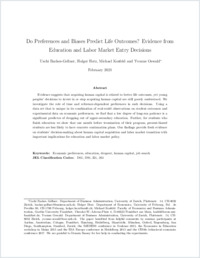Do preferences and biases predict life outcomes? Evidence from education and labor market entry decisions
BP2-STS
- Backes-Gellner, Uschi Universität Zürich
- Herz, Holger ORCID Université de Fribourg
- Kosfeld, Michael Universtiät Frankfurt
- Oswald, Yvonne Universität Zürich
- 10.03.2021
Published in:
- European Economic Review. - 2021, vol. 134, p. 103709
English
Evidence suggests that acquiring human capital is related to better life outcomes, yet young peoples’ decisions to invest in or stop acquiring human capital are still poorly understood. We investigate the role of time and reference-dependent preferences in such decisions. Using a data set that is unique in its combination of real-world observations on student outcomes and experimental data on economic preferences, we find that a low degree of long-run patience is a significant predictor of dropping out of upper-secondary education. Further, for students who finish education we show that one month before termination of their program, present-biased students are less likely to have concrete continuation plans. Our findings provide fresh evidence on students’ decision-making about human capital acquisition and labor market transition with important implications for education and labor market policy.
- Faculty
- Faculté des sciences économiques et sociales et du management
- Department
- Département d'économie politique
- Language
-
- English
- Classification
- Economics
- License
- Rights reserved
- Open access status
- green
- Identifiers
-
- DOI 10.1016/j.euroecorev.2021.103709
- ISSN 0014-2921
- Persistent URL
- https://folia.unifr.ch/unifr/documents/313376
Statistics
Document views: 59
File downloads:
- backes-gellneretal-dropouts_1.pdf: 286
